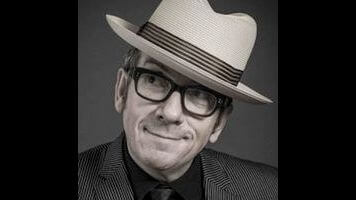Elvis Costello pens a scattershot scrapbook autobiography

There is another, better book hidden inside Elvis Costello’s 670-page memoir Unfaithful Music & Disappearing Ink. That book is about Ross MacManus, the author’s father, whose presence looms large over this meandering, episodic sketch of a life that in many ways mimics the restlessness of the 61-year-old’s back-catalog. Costello (born Declan Patrick MacManus) moves through time fluidly, his recollections gathered haphazardly, taking two or three steps forward before jumping back to check his compass, the needle pointed firmly toward his father.
Anyone familiar with Costello’s songbook is aware of his own encyclopedic knowledge of nearly everyone else’s. That historical reverence is evident everywhere in the pages of his memoir: There’s the failed effort to coerce Frank Sinatra’s lyricist Sammy Cahn to pen lyrics to what would become “The Long Honeymoon” (from Costello’s 1982 release Imperial Bedroom); the aftermath of Hurricane Katrina that unites him with New Orleans legend Allen Toussaint for a performance of “Freedom For The Stallion” at Lincoln Center; the time when members of The Damned lit his shoelaces on fire and poured ashes into his gaping, sleeping mouth; or when he approached a solitary Chet Baker at a London bar to ask him to play trumpet on “Almost Blue.” Costello’s book contains more characters than a Dickens novel, minus the discipline of a driving narrative.
When you’re dealt a life full of characters as rich as Paul McCartney, Bob Dylan, George Jones, David Bowie, Aretha Franklin, Johnny Cash, Tony Bennett, Tom Waits, Emmylou Harris, and Martin Scorsese—to name only a small fraction of the giants who parade across the stage of Unfaithful Music—perhaps a bit of disordered, snapshot storytelling is forgivable. But it’s difficult to imagine readers, other than the most patient devotees of Costello, enduring this collage and wading through the clippings, wishing the author would linger longer in the anecdotes to flesh them into full-blown tales.
Early on, Costello writes about his own songwriting process: “If I had wanted to be a poet, I’d have needed to be a damn sight more accurate with my word choices, but I didn’t, and still do not, necessarily see poetry as a higher, superior calling to that of the lyricist.” As if to remind us of his facility with words, Costello fills Unfaithful Music with lyrical interruptions, featuring lines from his most beloved tunes. As a writer of prose, Costello is surprisingly reticent when speaking of himself, better when describing the music of peers and heroes, and at his best when recalling his father’s overarching influence on his career and life.
Ross MacManus cut a fascinating figure in his own right. “While other dads came home at 5:30, my father went to work at 6 p.m. …To sing with the Joe Loss Orchestra,” writes Costello. He fondly recalls watching his father rehearse at the Hammersmith Palais, admitting, “It was impossible to say how much it meant to me to be there or to speak of all the things I probably learned from those few afternoons lurking in the dark.”
Costello describes his father at home rifling through freshly pressed 45s, learning new tunes to perform with the orchestra. One memorable occasion draws the young Elvis from his bedroom as his father plays the Beatles’ “Please Please Me” over and over until tossing it aside with the rest of the records he’d already memorized. “From that moment on,” writes Costello, “I had the pick of the new releases my Dad was obliged to learn. Those records were going nowhere. I suddenly had 10 times the records that my pocket money would have bought me.”
Near the end of Unfaithful Music, Costello tells of his father’s passing: “I heard a breaking voice that did not seem to belong to me say, ‘I love you, Daddy.’” And as he hears his last breath empty into the quiet room, “I looked back to the hollowed husk, still wearing a curious printing of my father’s stilled face.” In these moments, Elvis Costello briefly appears wholly himself, through the forest of anecdotes that come to overwhelm his memoir and its true subject. At the funeral, “it fell to me to tell the story of my Dad’s life,” he writes. “It read like a very full and beautiful life.”
At some future point, the tale of Costello’s own full and beautiful life will likely fall upon some other soul, to tell it with the same intimacy that appears too briefly amid this sometimes fascinating, often frustrating scrapbook of an autobiography.